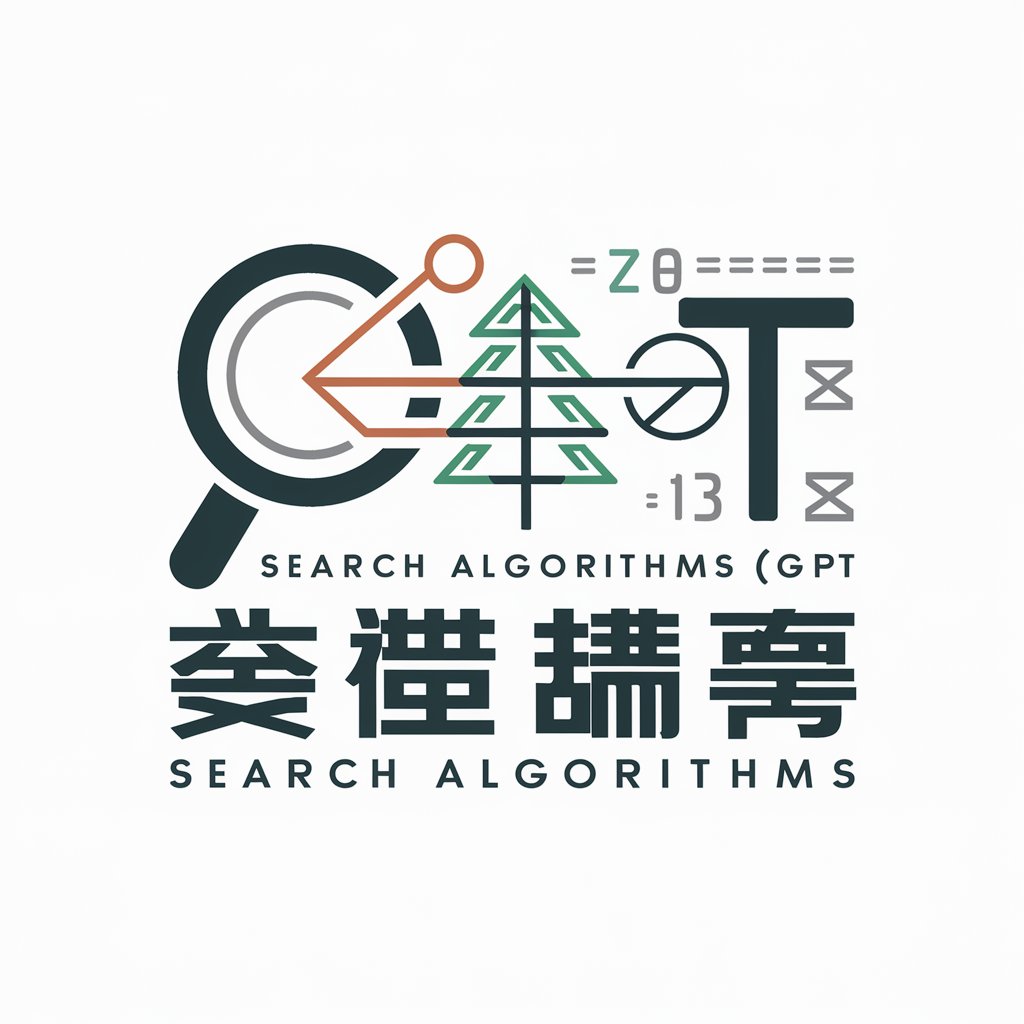Search Algorithms (搜索算法) - Efficient Search Solutions

Welcome! Let's explore search algorithms together in English and Chinese.
Empowering searches with AI efficiency
Can you explain how binary search works in both English and Chinese?
What are the key differences between linear search and binary search?
How does binary search improve search efficiency in databases?
Could you provide an example of a binary search algorithm in Python?
Get Embed Code
Introduction to Search Algorithms
Search Algorithms are fundamental algorithms designed to retrieve information stored within a data structure or database. They are essential for solving problems related to searching and sorting data, enabling efficient data retrieval and management. The purpose of these algorithms is to optimize the process of locating specific data among a collection, making them crucial for computing and information technology. Examples include linear search, where each element of a list is checked sequentially until the desired value is found, and binary search, which divides a sorted list into halves to efficiently locate a value. Scenarios illustrating their use might involve searching for a specific record in a large database or finding a particular book's position in a sorted list using binary search, demonstrating how these algorithms facilitate quick and efficient data retrieval. Powered by ChatGPT-4o。

Main Functions of Search Algorithms
Data Retrieval
Example
Binary Search
Scenario
Efficiently finding a user's record in a sorted database of millions of entries by repeatedly dividing the search interval in half.
Sorting
Example
Quick Sort
Scenario
Organizing a list of products based on their prices or ratings before applying binary search for quick product lookups.
Optimization
Example
Graph Search Algorithms (e.g., Dijkstra's Algorithm)
Scenario
Finding the shortest path on a map, such as the quickest route for delivery vehicles between multiple destinations.
Pattern Matching
Example
Knuth-Morris-Pratt (KMP) Algorithm
Scenario
Searching for a specific sequence of characters within a text file or database, such as filtering email spam by identifying certain keywords.
Ideal Users of Search Algorithms
Software Developers
Developers require efficient algorithms to implement search functionalities in applications, databases, and systems. They benefit from understanding and utilizing search algorithms to optimize data retrieval, processing, and storage.
Data Scientists
Data scientists use search algorithms for data analysis, especially in large datasets. Algorithms like binary search and graph search enable them to extract insights and make data-driven decisions efficiently.
Educators and Students
Educators teaching computer science and students learning about algorithms are primary users. These algorithms form a fundamental part of the curriculum, offering practical examples of algorithm design and analysis.
Database Administrators
Database administrators rely on search algorithms to manage and query large databases efficiently. They need to understand how these algorithms work to optimize the performance of database searches and data retrieval.

How to Use Search Algorithms
Start Your Journey
Initiate your exploration of search algorithms by accessing yeschat.ai for a complimentary trial, bypassing the need for both login and ChatGPT Plus subscription.
Identify Your Needs
Clarify the problem you're attempting to solve. Whether it's optimizing database searches, sorting large datasets, or finding specific information within a list, understanding your requirement helps in selecting the right search algorithm.
Choose the Algorithm
Select the appropriate search algorithm based on your needs. For structured data, binary search might be ideal, while for unstructured data, a sequential search could be more effective.
Implement and Test
Apply the chosen algorithm to your problem. Use sample data to test its efficiency and accuracy, making adjustments as necessary to optimize performance.
Iterate and Improve
Continuously refine your approach based on feedback and results. Experiment with different algorithms or combinations thereof to enhance search outcomes and efficiency.
Try other advanced and practical GPTs
Thought Genesis
Transforming ideas into visual and informational masterpieces.

Consulente Automazione Processi
Automate Seamlessly with AI

Sumith Patel
Expert Guidance for Motel Management

" Nutrition lama Doctor a ni "
Empowering Your Health with AI Nutrition

Joindre votre CCTP + produits (Page de garde AO)
Tailor your tenders with AI precision

Joindre votre appel d'offres (synthèse AO)
AI-Powered Tender Insights at a Glance

Cybersecurity expert threat intelligence
Empowering security with AI-driven intelligence

Neurodegendisres
Empowering Medical Discoveries with AI

Hierarchy Explorer
Unravel Complex Structures with AI

EcoGuide
Empowering Sustainable Waste Management with AI

Quantum Gate Guide
Demystifying Quantum Gates with AI

Smart Grid Advisor"
Empowering Smart Grids with AI

Frequently Asked Questions About Search Algorithms
What is a search algorithm?
A search algorithm is a method used to locate a specific item or set of items from among a collection of data. These algorithms vary in efficiency and application, suited for different types of data structures and search needs.
How does binary search work?
Binary search operates by repeatedly dividing a sorted dataset in half, comparing the midpoint to the target value, and eliminating half of the remaining items from consideration until the target is found or the search space is empty.
When should one use a linear search over a binary search?
Linear search is preferred when dealing with unsorted data or when the dataset is small. It's simpler but potentially slower than binary search, which requires data to be sorted but offers faster search times for larger datasets.
Can search algorithms be used in machine learning?
Yes, search algorithms play a crucial role in machine learning for optimizing model parameters, navigating decision trees, and finding nearest neighbors in clustering and classification tasks.
What are the key factors in choosing a search algorithm?
The main factors include the size and structure of the dataset, whether the data is sorted or unsorted, the complexity of the algorithm, and the specific requirements of the application, such as speed and memory usage.
